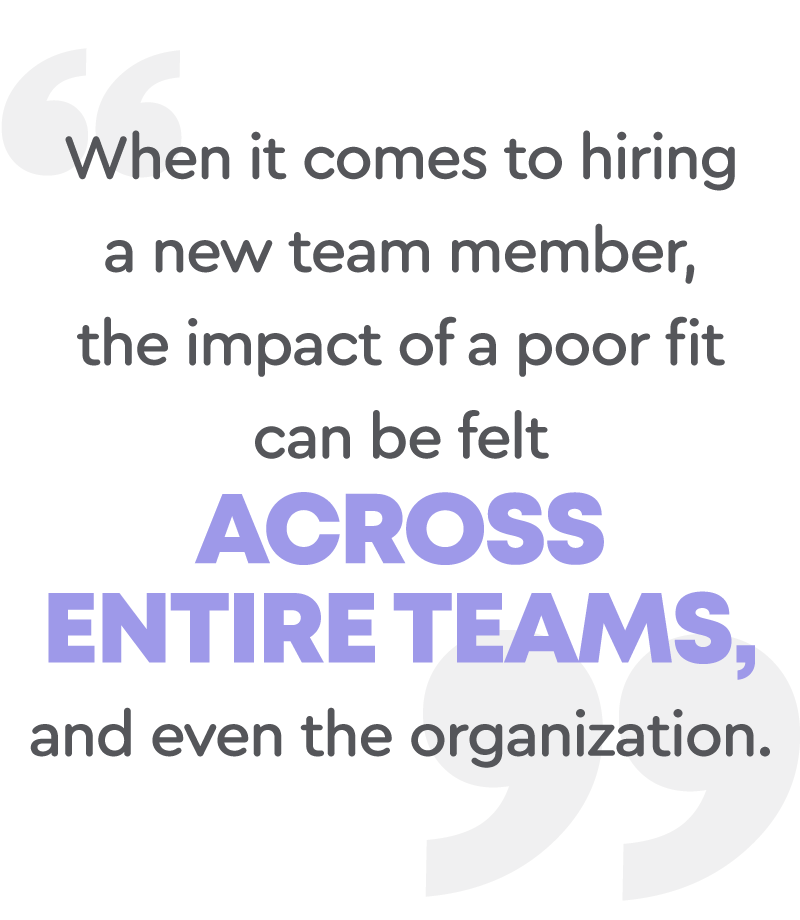The 9 Avoidable Mistakes That Most Hiring Professionals Are Making Today

Mistakes are a necessary part of true growth and a deeper understanding of ourselves. Without the pain of making an error or two, there’s little reason to ever change our ways (or the status quo), right?
That said, we should try to “save” those mistakes, and the forgiveness of our peers, for a rainy day. There are plenty of minor mishaps that are consistent in the hiring process, resulting in easy-to-avoid, but costly-to-fix, issues.
Let’s take this opportunity to learn from our predecessors and explore the most common hiring mistakes and blunders that should be on every hiring professional’s radar:
1. Losing focus of the candidate’s needs
93% of people feel anxious at a job interview – that’s nearly everyone that you’re meeting with. As candidates adjust to interviewing from the comfort of their homes (at least for the time being), hiring pros also have to adjust how they approach the candidate experience.
Consider the unique tools and support they may need for a virtual interview, like assistance using tech, or an in-person meeting in a socially-distanced world, such as information about PPE.
2. Not using a structured interview format
There’s a reason that most meetings have an agenda – having a solid structure improves human efficiency. For every req you’re trying to fill, you should spend time planning the questions that you’ll be asking each candidate. This exercise ensures that you’re remaining consistent throughout your interviews and that you can keep the conversation on track when it (inevitably) veers into different territory.
3. Lack of preparation
Knowledge is power. If you have ample time to prepare for an interview, always make sure that you’re reading through the job description and all of your notes to ensure that you’re ready to answer anything that the candidate might ask you. Here are the 4 key measures that you should be taking every time. There’s nothing more unprofessional (or uncomfortable) than an interviewer who seems less informed than the candidate themselves.
4. Checking out of the conversation
We’ve all been there – dreading a meeting or an interview because it’s just not the highest priority or it’s simply a favor to be kind. No matter the situation, your attention should be focused on the candidate and your conversation for the entire duration of the interview. Losing interest or becoming distracted by external factors is disrespectful and has potential to ruin detrimental relationships, even if you aren’t privy to the impact at the time (Glassdoor reviews can be brutal).
5. Focusing on interview length
Scheduling an interview is standard – you block off a set amount of time to talk to every candidate. But, people aren’t standard.
An interview shouldn’t be seen as a win or failure because it was shorter – or longer – than another candidate’s. Interviews should be as long as they need to be to make the right decision for the role – no more, no less. Simple, right?
6. Overlooking the candidate’s cultural fit
There are countless outside stressors influencing people every single day. When it comes to hiring a new team member, the impact of a poor cultural fit can be felt across entire teams, and even the organization. Asking questions about candidates’ values may seem like crossing into personal territory, but the reality is that work makes up a large part of life, and if someone isn’t going to mesh well with their colleagues, you’re saving them the hassle too.
7. Asking pointed questions
If questions are too direct, you could be leading candidates to the response that you want them to give or limiting them from providing additional information of value. In both cases, you’re altering your perception of who they are, what their experience is, or how equipped they are for the role. Keep interview questions open-ended so you can more effectively gauge exactly who a candidate is, instead of who you may want them to be.
8. Setting different standards for themselves
Candidates are expected to look professional, have friendly body language, candidly share things about themselves, and be engaged in conversation (among countless other things). It’s only fair that you do the same. For every single interview. In the same vein as structuring the conversation and doing research, your personal conduct is integral to their decision making process. Losing a star candidate over a messy Zoom background is definitely not worth it.
9. Pitting candidates against each other
Some roles are so black and white that comparing candidates is a no brainer – Marie has 10 years more experience than Joe and she crushed the interview, so you extend an offer to Marie. Most reqs aren’t that clear though, and it’s easy to accidentally cloud yourself in judgment or favoritism after an especially great (or horrible) interview. Filling a role might feel a whole lot like a competition sometimes, but there are plenty of instances where cultural fit trumps experience or a seemingly-great hire is everything but.
Improve Your Hiring Process Today
This list may seem like a lot to balance at once, but these classic hiring mistakes are easy to learn from and base your hiring process off of. After all, having a great hiring process means hiring great people. It also means hiring more of them, at a faster rate. How do we know that? Because we see it happen every single day.
interviewstream’s remote interviewing software helps organizations around the world throughout the hiring process – from building question sets to screening candidates to sharing interview feedback with your team. We’d love to show you how firsthand – chat with a client success expert today!
About The Author
Drew Whitehurst is the Director of Marketing, RevOps, and Product Strategy at interviewstream. He's been with the company since 2014 working in client services and marketing. He is an analytical thinker, coffee enthusiast, and hobbyist at heart.
